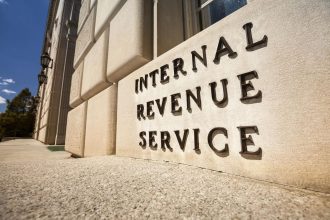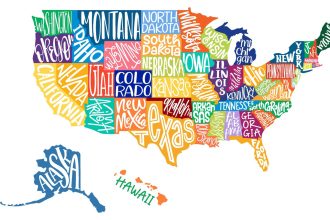This is a published version of our weekly Forbes Tax Breaks newsletter. You can sign-up to get Tax Breaks in your inbox here.
Tax Day came and went this week for most taxpayers (those of us still on extension got a little breather—except for the check we had to write). As of April 5, 2024—the last date for which data is available—the IRS had received 101,849,000 tax returns, compared to 101,320,000 returns received as of April 7, 2023, a .5% increase. (☆) That’s on pace to meet estimates, as the IRS had previously announced that they expected more than 128.7 million individual tax returns to be filed by Tax Day, April 15, 2024. (☆)
So far, however, the number of refunds issued remains lower than those from last year. The IRS has issued 66,799,000 tax refunds as of April 5, 2024, compared to 69,095,000 tax refunds issued as of April 7, 2023, a decrease of 3.3%. That works out to $201.117 billion in total refunds, compared to $198.868 billion in 2023, a decrease of 1.1%.
(You can read what the IRS Commissioner had to say about the season below. And once the data completely settles from the season, I’ll give you a final update.)
Anecdotally, a number of taxpayers and tax professionals have noted that they’ve seen fewer refunds all around, and more checks that had to be written. My sense, as I tweeted earlier this week, is that it’s a combination of getting used to the “old” pre-Covid rules and continued confusion over the revamped W-4. And there were a lot of job changes last year.
A little related Tax Day advice? If the day flew by and you missed it, or didn’t get around to filing a return, don’t give up. You can still file. Missing the deadline isn’t the end of the world, but since the failure-to-file penalty is based on time, the sooner you can file, the better.
(Remember that some taxpayers automatically get extra time, including those who are out of the country. Those taxpayers may also have additional filing obligations. U.S. tax laws cast a wide net, ensnaring U.S. tax “residents” not only on their worldwide income, but also requiring special tax reporting for foreign accounts and assets. Whether it’s dividends from a French firm, profits from selling property in Cairo, or even winnings from a Polish lottery, all income is fair game for taxation. The intricate maze of U.S. tax requirements opens the door to harsh penalties for missteps.)
If you filed but didn’t pay, my advice remains the same: pay when you can. And if you can’t pay the entire amount, pay something. Don’t put it off now that Tax Day is over—the failure-to-pay penalty is also calculated on time. Plus, interest will also accrue on your balance due (yes, on top of the penalty).
If you’re looking for a refund for the tax year 2020—the IRS estimates more than $1 billion in refunds remain unclaimed—remember that you have until May 17, 2024. Typically, the filing deadline to claim old refunds is April 15, the “normal” filing date. But the three-year window for 2020 unfiled returns was postponed to May 17, 2024, due to the pandemic.
Speaking of refunds, many business owners are still waiting for their Employee Retention Credit (ERC) refund. If you haven’t received yours yet, the Taxpayer Advocate Service (TAS) may be able to help you navigate through the process. The TAS is a resource for taxpayers who have not been able to get relief from the IRS through the regular administrative channels.
Business owners also have a responsibility to keep excellent payroll records. According to the IRS, some employers withhold tax from employee paychecks but do not remit those taxes to the authorities. Employers who intend to cheat may withhold taxes from employees but not file employment tax returns with the IRS or make federal tax deposits. Not filing the forms makes it hard to catch the employers—it’s as if they didn’t exist. When that happens, the IRS refers to them as ghost employers. In June 2020, the IRS established the Ghost Employer Project to investigate this noncompliance—before the initiative, the IRS had not attempted to detect ghost employers. The Treasury Inspector General for Tax Administration, or TIGTA, recently released a report evaluating those efforts. Their findings? There is more work to be done. (☆)
The IRS was able to increase their scrutiny of payroll taxes by using technology to examine data—something that’s increasingly available. In 2016, the average company managed 162.9 terabytes (TB) of data. Now, in 2024, roughly 2.5 quintillion bytes worth of data are generated each day, with over 44 zettabytes of data in the entire digital universe. Those figures are expected to grow even larger, thanks to generative AI. Amid a jumble of value-added taxes, digital taxes, and corporate minimum rates, some argue the solution may be as simple as shifting the tax burden to one of corporations’ most valuable resources: data. Is it feasible? Could it work? And what would it look like?
Finally, many of you know that I cut my teeth in the tax world on estates (including a a stint with the IRS estates division). I love a great estates-related story and I was immediately interested in chatter this week related to O.J. Simpson’s estate.
Here’s what happened: Simpson’s executor, Malcolm LaVergne, raised some eyebrows when he suggested that he would do everything in his power to keep estate funds away from the families of Ron Goldman and Nicole Brown who won a civil judgment against Simpson years ago. LaVergne later walked his statement back somewhat—and for good reason. Under Nevada law, where Simpson’s will was probated, expenses get paid first and then debts like the civil judgment before the beneficiaries of the estate are paid.
The estate may also be subject to probate in other jurisdictions, like California and Florida. Before he lived in Nevada, Simpson lived in Florida—a debtor-friendly state. Nevada is also fairly friendly to debtors during lifetime, but the rules for estates leave little room for discretion. The result? It’s complicated. (☆)
(For even more good stuff on estates—and new information on inherited IRAs—be sure to scroll down to A Deeper Dive below.)
That’s a lot of news for post-Tax Day, and there’s more to come (next week, we’ll have info on a new tax form, 2023 tax stats from the IRS, and a look at laws on the books that may leave you responsible for your relatives’ medical and nursing home debt).
Thanks for reading!
—Kelly Phillips Erb (Senior Writer, Tax)
Articles marked with (☆) are premium content and require you to log-in with your Forbes membership credentials. Not a subscriber yet? Click here to sign up.
One Of The Best Tax Seasons?
With the ink not even dry on some tax returns, IRS Commissioner Danny Werfel has deemed it “one of the best tax seasons the nation has seen in years.” (☆)
Werfel delivered the message as part of an end-of-filing season message. He touted improvements, including improved phone service, increased hours at walk-in sites, and more use of its virtual assistant tool (a fancy way of saying chatbot) on key IRS.gov pages. Werfel says, “It’s clear that we’re seeing historic improvements in taxpayer service levels, and the agency is rebounding from some very tough and lean years during the past decade.”
The Commissioner says these improvements are the result of the Inflation Reduction Act funding. The Act significantly boosted funding for the IRS, guaranteeing tens of millions of dollars over its operating budget for improvements and enforcement.
But, Werfel says, “there should be no mistaking that we need to do more at the IRS.”
Questions
One of the things that I tell my clients is that almost everything is fixable. Sometimes, however, time limits impact how fixable something might be. That’s exactly the focus of this week’s question. A reader wrote, in part:
I have a question for my mom. She was unemployed for most of 2023, and decided to withdraw her IRA and close the account. She didn’t have to pay any early withdrawal penalties… but believed that since she withdrew the money during the year she was unemployed she would only have to pay taxes at the lowest tax rate.
Due to the total withdrawal of $250k, she’s having to pay significantly more than anticipated. Is there any way to file taxes to spread the distribution over multiple years and pay taxes at the lower income tax bracket?When you make a withdrawal from your retirement account, it results in a taxable event.
And, since we have a progressive tax system (you can see the 2024 tax rates here), as you report more money in a single tax year, your tax rate goes up. Your mom owes more because the extra income pushed her into a higher bracket.
Under the rules, if you take an otherwise taxable distribution from an IRA or retirement plan, you can roll all or part of it into an IRA or a retirement plan within 60 days and not be subject to tax on the amount that landed back in the plan. You can also redeposit the money back into the existing IRA. If that happens in that 60-day window, the IRS will treat you as though you had never taken the money out in the first place—you’ll owe no tax.
If you miss the 60-day window, unfortunately, you’re out of luck on the tax side.
And while there is no way to spread out the tax after the fact, you can enter into an installment agreement with the IRS to pay the tax over time if you can’t pay all at once. Check with the IRS or your tax professional for more details.
—
Do you have a tax question or matter that you think we should cover in the next newsletter? We’d love to help if we can. Check out our guidelines and submit a question here.
A Deeper Dive
The IRS is allowing taxpayers some extra grace related to interpreting the RMD rules for inherited IRAs. (☆)
By law, you are required to withdraw funds from your retirement account each year after you reach age 73 (climbing to 75 in 2033). That amount is referred to as a required minimum distribution, or RMD. Typically, the amount you’re required to withdraw is figured each year by dividing your previous end-of-year account balance by your life expectancy.
If you inherit a retirement account, however, the rules are a bit different. Under current law, if you inherit a retirement account, you can withdraw all the money as a lump sum or over ten years. Some beneficiaries interpreted the language to mean they could wait until the end of the 10-year window to make a complete withdrawal—meaning that they didn’t have to make regular withdrawals every year for 10 years. The proposed guidance suggested the opposite.
The IRS has now issued Notice 2024-35, which—you guessed it—extends the relief through 2024 and makes clear that the final regulations will apply no earlier than the 2025 distribution calendar year. The relief applies to an RMD that would have been required if the IRA owner died in 2020, 2021, 2022, or 2023 and on or after the IRA owner’s required beginning date.
(Different rules apply to IRAs inherited before the new law took effect in 2020—those beneficiaries may still stretch withdrawals out over their life expectancies.)
In more retirement news, more than 70% of Americans are worried that higher taxes will be imposed on future distributions from traditional IRAs and 401(k)s, according to a recent study. That’s one reason a high percentage of participants in the survey said effectively managing taxes on retirement income is a priority. Widespread misinformation and misunderstandings—like focusing only on income tax rates—may keep people from considering IRA conversions. Another misconception is to wait until the end of the year, but waiting could cause you to miss opportunities.
And one more piece of retirement advice—while downsizing may be a smart financial move, it could also be a financial setback if you’re not careful. When downsizing, you may need to factor in tax changes, including the impact of selling your home and how tax laws in another state may be different than those in your current state. If you’re thinking of taking the plunge, ask questions—your tax pro or financial planner can help.
Listen Up
Taxpayers are still adjusting to changes as a result of the 2017 tax reform laws (there’s still no home office deduction for wage earners). In addition to causing confusion, those changes are not bringing in enough revenue to offset spending. What does that mean going forward? The Congressional Budget Office—the official government forecaster—released their latest deficit and debt forecasts for the next decade. And no surprise to anybody, says Tax Analysts Chief Economist Martin Sullivan, the outlook is quite gloomy. Our current deficit is about 5% of GDP, and it’s going to continue to grow to about 6% of GDP—about $2 trillion a year of extra debt.
You can find out more about the numbers, the research, and what it means for the future of tax policy in the latest Tax Analysts podcast episode (transcript available).
Positions and Guidance
The American Institute of CPAs (AICPA) expressed its strong support of H.R. 8007, the Disaster Tax Lookback Parity Act of 2024, in a letter to Representatives George Murphy (R-NC) and Jimmy Panetta (D-CA), who are original sponsors of the bill. Taxpayers impacted by disasters typically do not have the benefit of the lookback period for claiming credits and refunds being aligned with a postponed return filing due date, which this legislation would provide for all federally declared disasters.
The AICPA submitted a letter to the IRS requesting clarification and workarounds for the 990 Series Form instructions used by tax-exempt organizations. The AICPA’s recommendations include the clarification of instructions; the simplification, addition, and re-wording of language; and the updating of forms and instructions.
The AICPA submitted a letter to the Financial Crimes Enforcement Network (FinCEN) providing feedback on a proposed ruling and addressing concerns regarding the implications of the proposed regulations on Registered Investment Advisers (RIAs). The letter references FINCEN-2024-0006 and RIN 1506-AB58, Anti-Money Laundering/Countering the Financing of Terrorism Program and Suspicious Activity Report Filing Requirements for Registered Investment Advisers and Exempt Reporting Advisers as proposed by FinCEN.
Important Dates
📅 May 15, 2024. Information tax returns (series 990) are due for tax-exempt organizations with a tax year ending in December.
📅 May 17, 2024. Deadline for filing for refunds for tax year 2020. The IRS has announced that almost 940,000 people have unclaimed refunds for tax year 2020.
📅 June 17, 2024. Second quarter estimated payments are due for individuals for the 2024 tax year.
Noteworthy
Forbes has released our inaugural America’s Top 200 CPAs list. It is a compilation of the finest CPAs active in public practice, culled from candidates sourced through independent nominations and accolades from every society and association of CPAs. Nominees were rated on a range of weighted criteria, including expertise, innovation, thought leadership, experience, service to the community and their profession, and responses to selected questions.
Michael Plowgian, top OECD negotiator and former Deputy Assistant Secretary (International Tax Affairs), Department of the Treasury, has returned to KPMG. Plowgian completed two stints at the Treasury and was pivotal in advancing Pillar Two, among other policies. Avalara, Inc., a provider of cloud-based tax compliance automation for businesses of all sizes, announced that
Ross Tennenbaum has been appointed president. As Avalara’s president, he will oversee the majority of Avalara’s business operations. Tennenbaum will also lead the teams responsible for Avalara’s customer and compliance operations, finance functions, India operations, and legal functions.
Registration is open for the National Association of Enrolled Agents (NAEA) 2024 Capitol Hill Fly-In Day. Over three days, May 20-22, 2024, NAEA will meet with policymakers, IRS experts, and DC thought leaders about Congress and its implications for enrolled agents.
—
If you have career or industry news, submit it for consideration here.
Trivia
Years ago, the IRS issued guidance related to the Small Business Jobs Act of 2010, which removed what now-ubiquitous item—often issued to employees—from the definition of listed property, a category under tax law that normally requires additional recordkeeping by taxpayers?
A. Company cars
B. Laptops
C. Cell phones
D. Business lunches
Find the answer at the bottom of this newsletter.
Our Team
I hope you’ll get to know some of our staff and contributors. Since I reported on ghost employers this week, I’d love to know: What’s the scariest movie you’ve ever seen?
Kelly Phillips Erb (Senior Writer, Tax): I’m easy to frighten. But the first scary movie that I remember seeing was Vertigo—it was terrifying. Hitchcock was a movie genius.
Emma Whitford (Writer, Education): The Shining—It’s the only scary movie I’ve seen or will see. I’m a chicken.
Amber Gray-Fenner (Contributor, Tax): Blair Witch Project. Will not watch again. And I like horror movies.
Mitchell Martin (Editor, Digital Assets): Scariest movie: The original Alien.
Virginia La Torre Jeker (Contributor, Tax): The scariest movie: Silence of the Lambs.
Andrew Leahey (Contributor, Tax): The scariest movie I have ever seen was one I have been trying to identify for years. It would have been on basic cable circa 1989, and it involved little alien creatures (not Gremlins!) eating a family. The scene that is forever etched in my memory involves a small boy overhearing the critters eating his mother, and accidentally rolling a baseball down the stairs to the creatures. He is unsure if they have noticed, when the ball is returned up the stairs covered in blood. Might be misremembering, but I’ve popped awake thinking about that scene at least once per calendar year for the last 35 years. (Author’s note: I’m stumped, too. If you know what Andrew is talking about, drop me a line!)
Key Figures
That’s the estimated tax liability attributed to over 162,000 potential ghost employers as part of IRS efforts to identify employers who are not properly remitting taxes that have been withheld from employee wages.
Trivia Answer
The answer is (C) cell phones.
In 2011, the IRS issued Notice 2011-72, which provided guidance on treating employer-provided cell phones as an excludible fringe benefit.
Under the guidance, where employers provide cell phones to their employees or where employers reimburse employees for business use of their personal cell phones, tax-free treatment is available without recordkeeping requirements. The guidance does not apply to the provision of cell phones or reimbursement for cell phone use that is not primarily business-related (those are generally taxable).
Feedback
How did we do? We’d love your feedback. If you have a suggestion for making the newsletter better, let us know.
Read the full article here














